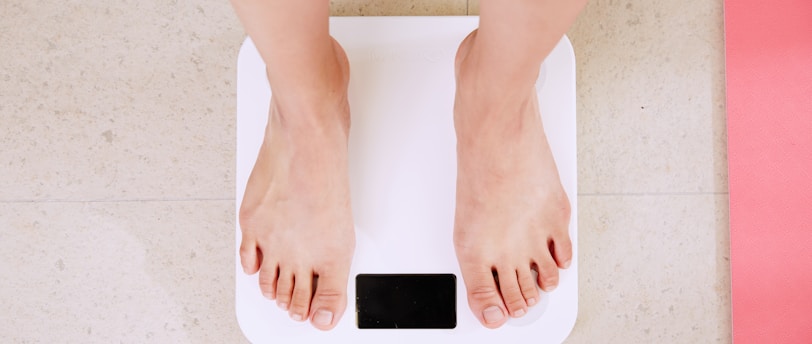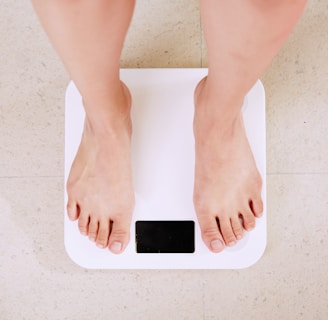Informações sobre saúde para você !
10 Effective Weight Loss Tips to Achieve Your Goals in 2025
Discover 10 effective weight loss tips that will help you achieve your goals in 2025. Learn how to adopt sustainable habits, optimize your diet, and stay motivated to shed pounds and improve overall health. Losing weight can be a challenging journey, but with the right strategies, achieving your goals is more than possible. If you're looking to shed those extra pounds in 2025, it's essential to focus on sustainable habits rather than quick fixes. In this article, we’ll provide 10 effective weight loss tips that will help you lose weight safely, stay motivated, and create lasting changes for a healthier lifestyle.
WEIGHT LOSS
2/3/20255 min read


Tip 1: Set Realistic and Specific Goals
When it comes to weight loss, setting clear, realistic goals is the first step toward success. Having vague goals like "I want to lose weight" often leads to frustration and lack of direction. Instead, break down your goals into manageable milestones.
Why Specific Goals Matter
Set specific, measurable, and time-bound goals to track your progress effectively. For example, instead of saying, "I want to lose weight," set a goal like, "I want to lose 5 pounds in the next month."
Make Your Goals Achievable
Be realistic about what you can achieve within a certain timeframe. Trying to lose too much weight too quickly can be harmful to your health and lead to discouragement if you don’t see immediate results.
Tip 2: Create a Caloric Deficit
Weight loss is all about consuming fewer calories than your body burns. This is known as a caloric deficit. By creating a deficit, your body starts to use stored fat as energy, leading to weight loss.
How to Create a Caloric Deficit
Track Your Caloric Intake: Use an app like MyFitnessPal to track how many calories you consume daily.
Increase Physical Activity: Exercise more to burn additional calories.
Focus on Nutrient-Dense Foods: Instead of focusing on low-calorie foods, aim to eat nutrient-dense foods that provide vitamins, minerals, and fiber without adding excessive calories.
Tip 3: Focus on a Balanced Diet
A healthy, balanced diet is key to long-term weight loss. Instead of following fad diets, focus on incorporating whole, nutrient-dense foods into your meals.
What to Include in Your Diet
Lean Proteins: Chicken, turkey, fish, eggs, and plant-based proteins like tofu and lentils.
Whole Grains: Brown rice, quinoa, oats, and whole-wheat bread.
Healthy Fats: Avocados, olive oil, nuts, and seeds.
Fruits and Vegetables: These are low-calorie, high-nutrient options that can fill you up without overloading on calories.
Why It Works
Protein helps build muscle and boosts metabolism, whole grains provide sustained energy, and healthy fats support cellular functions. A diet rich in fruits and vegetables is high in fiber, which aids digestion and promotes satiety.
Tip 4: Prioritize Regular Physical Activity
Exercise is one of the most effective ways to accelerate weight loss. While diet plays a crucial role, regular physical activity helps to burn calories, improve metabolism, and maintain muscle mass during weight loss.
Types of Exercises for Weight Loss
Cardio: Activities like running, cycling, swimming, or walking can help you burn calories and improve heart health.
Strength Training: Lifting weights or performing bodyweight exercises (like squats and push-ups) helps build muscle mass, which in turn increases your metabolism.
High-Intensity Interval Training (HIIT): HIIT workouts combine short bursts of intense exercise with recovery periods, making them efficient for burning fat.
How Much Exercise Is Needed?
Aim for at least 150 minutes of moderate-intensity aerobic exercise per week and incorporate strength training exercises twice a week.
Tip 5: Get Enough Sleep
Lack of sleep can have a significant impact on your weight loss efforts. Poor sleep affects the hormones that control hunger and appetite, making it harder to stick to your weight loss goals.
Why Sleep Matters
Hormonal Imbalance: Sleep deprivation increases levels of ghrelin (the hunger hormone) and decreases leptin (the hormone that signals fullness), which can lead to overeating.
Restorative Function: Sleep is when your body repairs and regenerates cells, including muscle tissue, which is important for weight loss.
Aim for 7-9 Hours of Sleep
Ensure you get enough sleep every night to support weight loss and maintain overall health.
Tip 6: Stay Hydrated
Drinking enough water throughout the day is an often overlooked yet important aspect of weight loss. Staying hydrated can help control hunger, increase metabolism, and support digestion.
Why Water Helps with Weight Loss
Appetite Control: Drinking a glass of water before meals can make you feel fuller, leading to a reduction in overall food intake.
Boosts Metabolism: Drinking cold water can slightly increase your metabolism as your body works to warm it up.
Aids Digestion: Proper hydration supports the digestion process, helping your body break down and absorb nutrients more efficiently.
How Much Water Should You Drink?
Aim for 8-10 cups (2-2.5 liters) of water per day. If you're active or live in a hot climate, you may need more.
Tip 7: Track Your Progress
Tracking your progress helps you stay motivated and ensures that you're on the right track. Whether you're tracking your weight, measurements, or how your clothes fit, monitoring progress will help you stay focused.
Tools for Tracking Progress
Weight and Body Measurements: Use a scale to track weight loss, but also measure your waist, hips, and other areas to track fat loss.
Food and Exercise Logs: Use apps to log your meals and workouts so you can spot patterns and make adjustments as needed.
Why Tracking Works
Tracking provides accountability and allows you to celebrate small successes along the way, helping you stay motivated throughout your weight loss journey.
Tip 8: Practice Mindful Eating
Mindful eating is about being present during meals and paying attention to the body’s hunger and fullness cues. By eating slowly and without distractions, you’re less likely to overeat.
How to Eat Mindfully
Chew Slowly: Take time to chew your food and savor each bite.
Avoid Distractions: Put away your phone, TV, or any other distractions during meals.
Listen to Your Body: Eat when you're hungry and stop when you're satisfied, not when you're full.
Why It Works
Mindful eating can prevent overeating by helping you become more aware of your hunger and fullness levels. It also improves your relationship with food, making meals more enjoyable.
Tip 9: Manage Stress
Chronic stress can lead to weight gain, especially around the abdomen. It can trigger emotional eating and increase the production of cortisol, a hormone that promotes fat storage.
How Stress Affects Weight Loss
Emotional Eating: Many people turn to food for comfort during stressful times, often choosing unhealthy, high-calorie options.
Hormonal Imbalance: Chronic stress leads to elevated cortisol levels, which may increase hunger and fat storage, especially in the belly area.
Stress Management Techniques
Exercise: Physical activity can reduce stress and boost mood.
Meditation: Regular meditation can help manage stress and anxiety.
Relaxation: Engage in activities like reading, yoga, or spending time with loved ones to unwind.
Tip 10: Stay Consistent and Be Patient
Weight loss is a long-term commitment, and results don’t happen overnight. Consistency is key to achieving lasting success. Remember that small changes, over time, add up to significant results.
Why Consistency Matters
Sustained Progress: Weight loss doesn’t happen in a straight line. Stay consistent with your efforts even if progress seems slow.
Avoid Crash Diets: Quick fixes may provide temporary results, but they often lead to rebound weight gain. Sustainable weight loss requires consistent effort and patience.
Be Patient with Yourself
Understand that it’s normal to face setbacks along the way. Stay patient, stay consistent, and trust the process.
Frequently Asked Questions (FAQ)
1. How quickly can I expect to lose weight?
The amount of weight you can lose depends on various factors, including your diet, exercise routine, and starting point. A healthy rate of weight loss is about 1-2 pounds per week.
2. Is exercise necessary for weight loss?
While diet is a significant factor, exercise helps accelerate weight loss by burning extra calories and improving metabolism. A combination of diet and exercise is the most effective approach.
3. Can I lose weight without dieting?
Weight loss is primarily driven by a caloric deficit, which can be achieved by either reducing your calorie intake (diet) or increasing physical activity (exercise). While exercise is important, diet plays a major role.
4. What should I do if I plateau?
If you hit a weight loss plateau, reassess your diet and exercise routine. You may need to adjust your calorie intake, try new exercises, or focus on different forms of physical activity.
Conclusion
Achieving your weight loss goals in 2025 requires more than just a quick fix. By adopting sustainable habits such as eating a balanced diet, exercising regularly, getting enough sleep, and staying consistent, you’ll be on your way to achieving long-term success. Remember that weight loss is a journey, and patience is key. Start implementing these 10 effective weight loss tips today, and take the first step toward a healthier, happier you.
Sources and Backlinks:
InfoHealth 4u
Artigos de saúde, produtos e dicas de saúde na palma da sua mão.
Contato
contact@infohealth4u.com
© 2024. All rights reserved.
